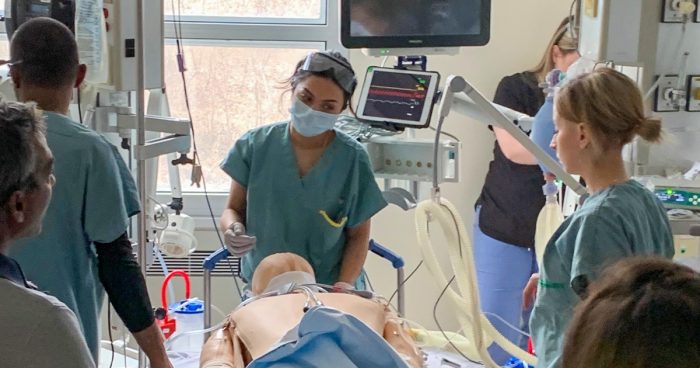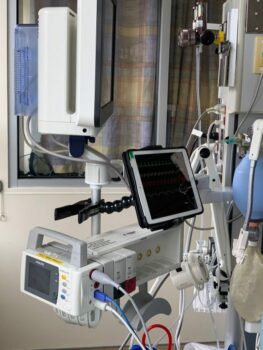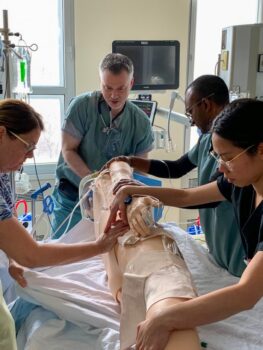Supporting our frontline colleagues during in situ simulation training
“When dealing with high-stakes issues such as providing frontline care to patients during this COVID-19 pandemic, we must be prepared to deliver optimal care and ensure the safety of the health care providers,” emphasizes Dr. Gerald Fried, Associate Dean of Education Technology and Innovation, and Director of the Steinberg Centre for Simulation and Interactive Learning (SCSIL). “The use of simulation training has been essential to adapting swiftly to this new health care environment. This was developed quickly and effectively through seamless partnerships between the SCSIL and the McGill teaching hospitals. Expertise was shared, equipment and supplies provided and the training was up and running quickly. This effective communication also enabled the hospitals to reach out to the SCSIL when needs for clinical equipment and personal protective equipment were identified. This synergy between education in situ and in the SCSIL will transcend the current crisis and enhance our ability to deliver outstanding educational programs throughout the McGill network in the future.”
Here are a few examples of the initiatives currently underway.
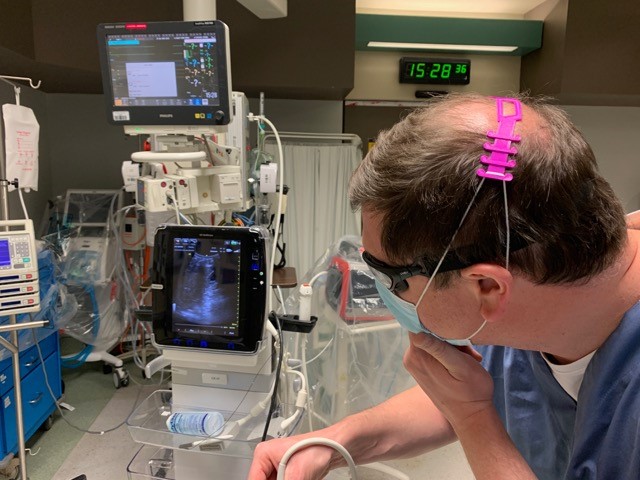
Point-of-care ultrasound provides timely diagnostic information to health care professionals, and has become essential in assessing patients with respiratory illness during the COVID-19 pandemic. Dr. Reuben Ostrofsky, COVID-19 Emergency Response Coordinator at the Montreal West Island Integrated University Health and Social Services Centre, is grateful for the additional ultrasound machines that the SCSIL has provided to both the Lakeshore and LaSalle Hospitals. “Having these machines in our resuscitation rooms enables physicians to have rapid access to imaging information and helps improve care, while preventing the spread of infection to other rooms and patients. It’s a great example of the McGill and Greater Montreal communities coming together to support frontline health care teams,” says Dr. Ostrofsky.
Simulation is very useful for practicing intubation and the steps leading up to it, as these are very high-risk moments for spread of the coronavirus to health care workers and other patients. Family Medicine physicians at the Lachine Hospital were able to refresh their intubation skills and review best practices for intubating a suspected COVID-19 patient using task trainers and manikins borrowed from the SCSIL.
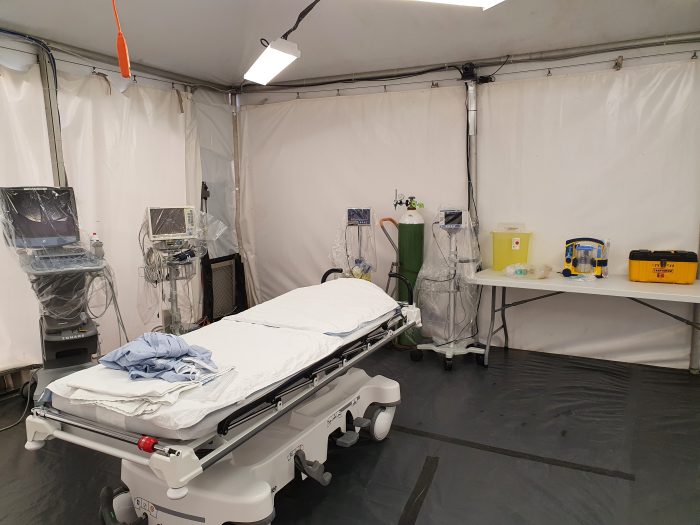
The Montreal General Hospital (MGH) of the McGill University Health Centre (MUHC) is a level one trauma centre and continues to treat people with the most complex and serious injuries. As Dr. Kosar Khwaja explains, “In order to provide additional capacity to assess and manage complex polytrauma patients and multiple casualty scenarios while taking the necessary precautions for suspected COVID-positive patients, a collaborative effort was initiated to create a Resuscitation Tent alongside the current Trauma Bay in the Emergency Department at the MGH.” The SCSIL loaned out four ultrasound machines and two glidescopes to support the MUHC Intensive Care Units and the Trauma Program.
“This has been an unprecedented time of change in our healthcare system,” explains Dr. Danielle Shafiepour, Assistant Professor at McGill University and Director of Simulation Education for McGill Anesthesiology Program Staff at the MGH. “We have had to adapt to COVID-19 by changing everything, from policies and procedures right down to the infrastructure of the spaces we work in. Simulation has proved to be an integral part of testing and training on all of these changes that have been implemented.”
To support the team’s ability to be mobile and to respond to the needs throughout the hospital, staff are using iPads and other equipment loaned from the SCSIL during simulation training. The iPads are used to control the manikins and to simulate patient monitors by displaying vital signs and ultrasound findings; this is less cumbersome that using the large monitors, and allows the training teams to be more mobile. The simulation team has travelled between the MUHC Glen site and MGH operating theatres, ICU, trauma bay and resuscitation tent to offer in situ training that includes donning and doffing, intubating, proning, mock code blue simulations, and patient transfers of COVID-positive patients.
Respiratory therapist and part-time SCSIL Simulation Educator Valerie Weagle has been coordinating the in situ training session with Dr. Shafiepour. “Valerie’s expertise and familiarity with the manikins has been essential for our in situ program,” says Dr. Shafiepour. “Every simulation that we have done has revealed useful actionable issues that we have been able to identify and fix rapidly in order to provide better care. Participants have included not only physicians, nurses and respiratory therapists, but also orderlies, radiology technicians, pharmacists and even security personnel who play a vital role in coordinating transport of COVID-19 patients throughout the hospital. We are all thankful to the SCSIL for their support.”
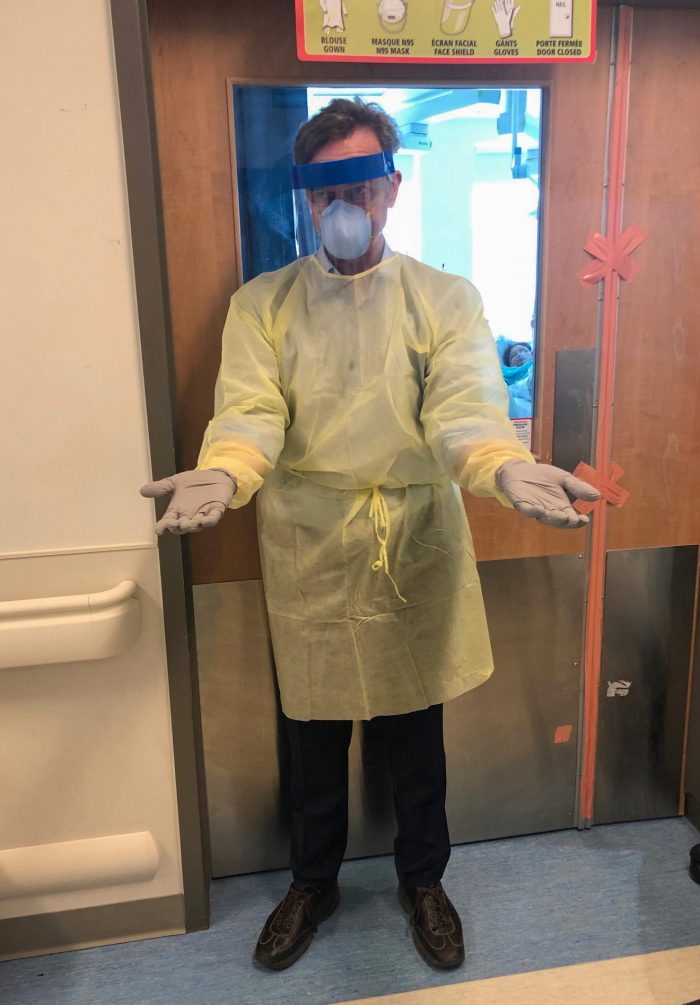 Safe Doffing and Donning
Safe Doffing and DonningAt the MUHC, Dr. Kevin Lachapelle, Founding and Former Director of the SCSIL, teamed up with Dr. Lily Nguyen and with Dr. Marco Mascarella to offer simulation training on the basic principles of personal protective equipment (PPE) when evaluating a patient with suspected or confirmed COVID-19. Critical care health care workers practiced the important steps to don (put on) and doff (take off) PPE in order to prevent contamination of the clothing and skin, and to completely protect the mucous membranes. This in situ simulation took place using materials donated from the SCSIL, and was supported by MUHC simulation experts Caroline White and Dr. Elene Khalil from the MUHC Educational Directorate.
“The proper use of PPE is the first line of defence against COVID-19. These practical, hands-on sessions really help end users put protocols into action and will keep patients and workers safe,” emphasizes Dr. Lachapelle.
To view the MUHC presentation and video on PPE, and to see other resources available to support health care workers, please consult the SCSIL COVID-19 Simulation Resources section of our website.

